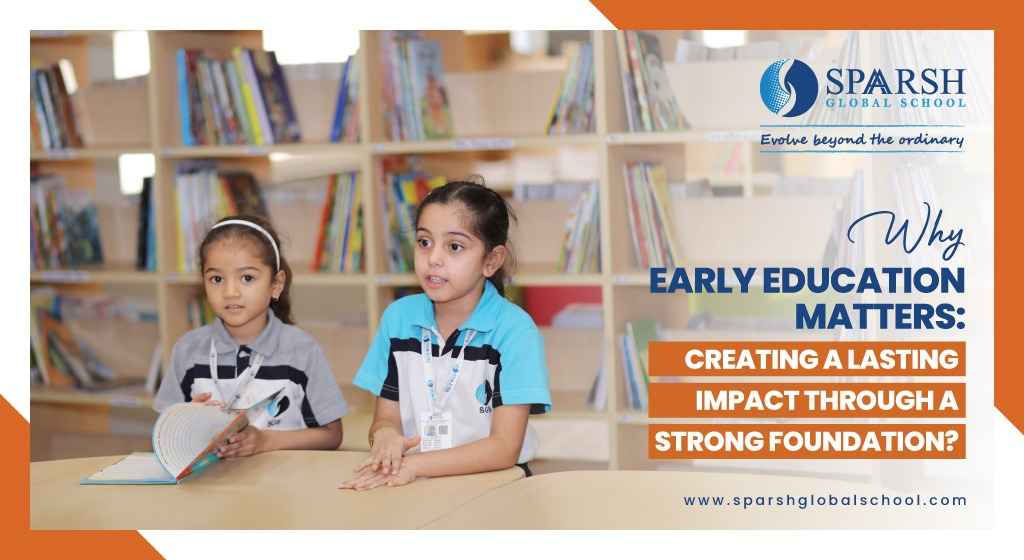Child development in the early stages determines a child’s behaviour traits and identifies strengths and areas of development. In the process, this prepares children for the world and begins with imbibing essential skills. The education industry, particularly early schooling, has gone through a lot of transformation in the past decades. Now young learners are trained to learn critical thinking and creative thinking skills, as well as emotional intelligence. This evolution also highlights integrated and playful learning spaces to address children’s specific needs. Early education fosters curiosity and teaches problem-solving abilities to prepare youngsters for the future. Early education lays the groundwork for success.

The Importance of Early Years
The period in childhood development, particularly the early stage of childhood, is very important for the development of the brain. Available data prove that as a child reaches the age of five, his or her brain has developed almost ninety percent of the full size it gains when the child grows into an adult. These early years define a child’s cognitive development, language development, social skills as well as their emotional health. Operating schools give structured learning settings within which young children can learn under the direction of experienced teachers.
During these years, children acquire important formative skills which include critical analysis, problem solving and speaking among others. This contributes to developing such abilities through age-appropriate learning materials, activities that involve manipulating objects and peer interactions. Preschool education also promotes creativity and develops an interest towards learning.
Building Social and Emotional Skills
Another great advantage of early education is that it helps children develop good emotions and effective social skills. During the group activity and with teachers’ intervention, children gain some experiences on sharing, working as a team and even learn how to solve a problem. From these experiences they learn about other people, compassion and forgiveness, problem solving and tolerance to change.
Early education also promotes regulation of emotions. Children are trained on how to ventilate their emotions in appropriate manners and how to develop strategies when they encounter issues. These are invaluable skills as they advance in their development and deal with various challenges within school and in other aspects of life.
Academic Readiness and Lifelong Learning
Early education can be associated with the later achievements of children. Research evidence shows that children who attend quality early education programmes have an easier time in primary school, both academically and socially. A school in Greater Noida West can provide a strong foundation, ensuring children develop a reasonable level of mathematical, literary, and spatial literacy that assists them in transitioning smoothly to formal education.
Also, early education helps to spring desirable motivation for learning. When children are exposed to interesting and challenging activities, they develop a positive attitude towards education. This curiosity normally follows them throughout their education journey, making them lifelong learners.
Reducing Learning Gaps
The other essential quality of early education is its effective and potential role in narrowing the gaps and practising equity. It is shown that children, coming from different backgrounds, should attend structured low intensity early childhood programmes, as it is shown to have an overall positive impact. Through eradicating these disparities at an initial stage, it becomes possible for every child to be more adaptive and reduce learning gaps.
It also flags if there is a developmental delay or any learning difficulty early enough to enable the child to receive help. Regardless of whether a child may need speech therapy, occupational therapies or extra help in getting ready for school, early identification means that the child receives all sorts of help and support to enable him or her to overcome the challenge.
The Role of Parents and Educators
Parents and educators are key partners in delivering effective early education. While parents provide a nurturing home environment, educators bring expertise in child development and pedagogy. Together, they create a holistic support system for children.
A well-rounded early education curriculum combines academics, play and extracurricular activities. By offering a balanced approach, educators ensure that children are not only learning but also enjoying the process. When parents actively participate in their child’s early education journey, it reinforces the lessons learned and strengthens the foundation being built.
Conclusion
Early education is an investment in the future, providing children with the tools they need to succeed academically, socially and emotionally. By emphasising the development of foundational skills, it creates a ripple effect that benefits individuals and society as a whole.
Schools like Sparsh Global School recognize the importance of early education in shaping young minds. Their commitment to offering a nurturing and stimulating environment ensures that children receive the best possible start in life. By prioritizing early education, Sparsh Global School helps students unlock their true potential and build a solid foundation for a bright and promising future.
FAQ
1.Why is early education important?
It builds a strong foundation for cognitive, social and emotional development, preparing children for lifelong success.




